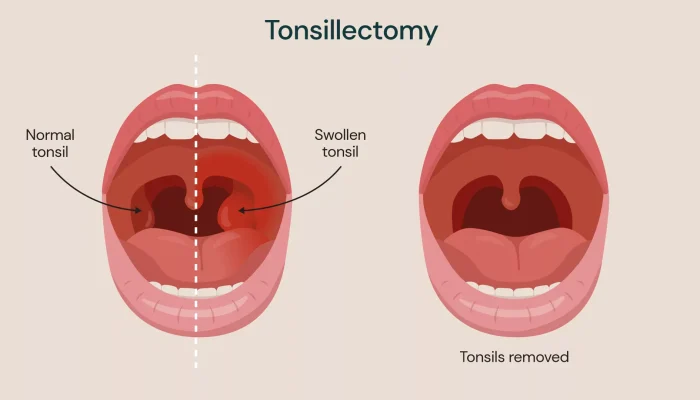
Tonsillectomy is a common surgical procedure performed to remove the tonsils, typically to treat chronic infections or breathing difficulties. If you’re considering a tonsillectomy, it’s essential to know what to expect before, during, and after the surgery. Consulting the Best ENT Doctor in Indore ensures a smooth and successful procedure with expert post-operative care.
Why is a Tonsillectomy Needed?
- Frequent or Chronic Tonsillitis – Recurrent throat infections that do not respond well to medications.
- Obstructive Sleep Apnea (OSA) – Enlarged tonsils that obstruct the airway during sleep, leading to snoring and breathing issues.
- Difficulty Swallowing – Large tonsils that cause discomfort while eating or drinking.
- Tonsil Stones (Tonsilloliths) – Hardened debris in the tonsils causing bad breath and discomfort.
Pre-Surgery Preparation
- Medical Evaluation – A thorough health check-up to assess your overall condition and suitability for surgery.
- Dietary Restrictions – You may be advised to avoid eating or drinking for a few hours before the procedure.
- Medications – Inform your doctor about any medications you are taking, as some may need to be paused before surgery.
- Post-Surgery Arrangements – Plan for someone to accompany you on the day of the surgery and assist with recovery at home.
What Happens During a Tonsillectomy?
- Anesthesia Administration – The patient is put under general anesthesia to ensure a painless procedure.
- Tonsil Removal – The surgeon removes the tonsils using one of several techniques, such as traditional scalpel removal, laser cauterization, or coblation.
- Bleeding Control – Any bleeding is controlled using cauterization or sutures.
- Recovery Room Monitoring – After surgery, patients are monitored in a recovery room until they wake up from anesthesia.
Post-Surgery Recovery
- Throat Pain and Discomfort – Mild to moderate pain while swallowing, managed with pain relievers.
- Swelling and White Coating in the Throat – Normal post-surgical effects that subside gradually.
- Changes in Voice – Temporary hoarseness or nasal-sounding speech.
- Dietary Adjustments – Soft foods and plenty of fluids are recommended to ease throat discomfort.
- Limited Physical Activity – Avoid strenuous activities for at least a week to promote healing.
When to Seek Medical Attention?
While complications are rare, you should contact your ENT specialist in Indore if you experience:
- Excessive bleeding from the throat
- Persistent high fever
- Severe dehydration due to difficulty swallowing
- Breathing difficulties or excessive swelling
Conclusion
A tonsillectomy can significantly improve your quality of life by reducing infections, sleep disturbances, and discomfort. Choosing the Best ENT Doctor in Indore ensures expert care, precise surgical techniques, and a smooth recovery process. If you or a loved one is considering a tonsillectomy, consult an experienced ENT specialist today for a thorough evaluation and personalized treatment plan.
